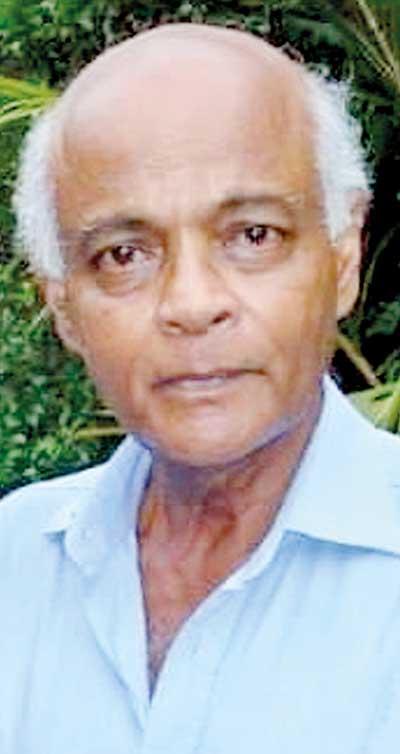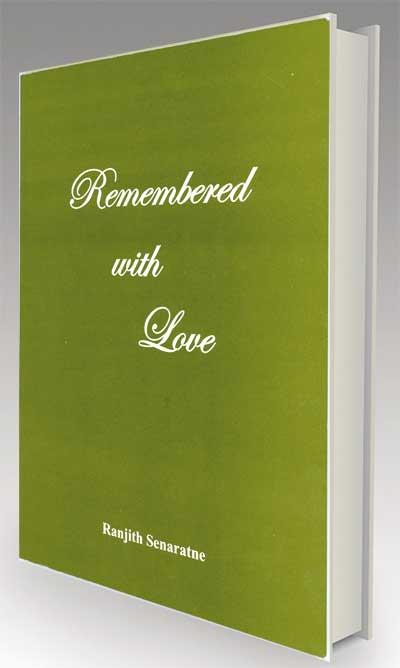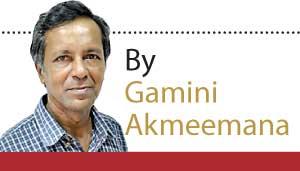Reply To:
Name - Reply Comment
Whether in strict sequence or not, the author has a gift for evoking marvellous images from a vanished past
Sometimes, a completely unknown writer will produce a book that can take the professionals by surprise. Remembered With Love, an autobiographical work by Ranjith Senaratne is one  such book.
such book.
This slim volume of reminiscences (148 pages) takes us back to his early childhood in coastal Wadduwa, and then to growing up in Colombo and ends with his experiences as an adult.
As the author puts it in his foreword:
“A child’s memories lack strict sequence: the tales often crisscross. Some even come creeping into my teens for the final twist.”
Whether in strict sequence or not, the author has a gift for evoking marvellous images from a vanished past – growing up in the 1940s is something which I cannot envisage and visualise, leave alone later generations, and his use of English is highly creative. The prose is sometimes poignant, sometimes whimsical or funny.
The son of a retired station master, he writes with sympathy and vigour about his siblings, nephews, neighbours (not always sympathetic) as well as passing phenomena such as the occasional aircraft – “a tiny, barely understood airplane was seen crawling far above, its engines hardly audible.”
The narrative is full of details of the daily life of a bygone era – the transport, or the confectionaries such as the “Orange pips’, or vendors such as the Chinese on his bicycle selling textiles, or the ‘Thorombol’ man. His descriptions of a long lost childhood often have a fairytale-like quality to them.
“How much richer than reality the imagination is,” the author writes in a later chapter. But what he gives us is reality filtered through the imagination of a wide-eyed child. Even when describing their nasty neighbours at Wadduwa, he retains this wonder-like quality, as if describing beings from another planet.
"The son of a retired station master, he writes with sympathy and vigour about his siblings, nephews, neighbours (not always sympathetic) as well as passing phenomena such as the occasional aircraft "
 He and his elder sister try to outdo each other staring at the sun, not knowing the damage this could cause the eyes. Writing about his step-sister Merlyn Akka, he says he can “Even playback the sounds of satisfaction she made when enjoying meals with capsicum curry. After one such dinner highlighting this malu-miris, she stepped out of the verandah, to begin walking a certain length, up and down across the sandy garden bathed in moonlight.”
He and his elder sister try to outdo each other staring at the sun, not knowing the damage this could cause the eyes. Writing about his step-sister Merlyn Akka, he says he can “Even playback the sounds of satisfaction she made when enjoying meals with capsicum curry. After one such dinner highlighting this malu-miris, she stepped out of the verandah, to begin walking a certain length, up and down across the sandy garden bathed in moonlight.”
It’s the author’s ability to find a bridge between the ordinary and the sublime which makes this book such a delight to read, not just the period detail such as the kind European nuns who nursed him when hospitalised with an infected nose, or Oti Sinho’s buggy cart, or the joy of rediscovering a childhood toy many years later as he passed a pavement hawker in Colombo. 
Sumanasekara was the nasty neighbour at Wadduwa. But he had a gramophone, always playing the same three songs. After a nasty row with neighbours, the family moves to Colombo, bringing in tow a temperamental bull. From their Slave Island home, the author discovers with joy Leslie aiya’s crystal radio set and “nice smelling gramophone” with a large collection of records, including songs by Ananda Samarakoon and “Especially the sonorous M. K. Vincent with his bell-like voice.”
Though the family lived in Wadduwa, the boy’s first glimpse of the sea is in Colombo, when the waves at the Galle Face Green are ‘green giants’ which terrify him. Even as an adult, he feels a ‘tremolo of indecision about water’ when travelling by boat. His memories seem to be inexhaustible; from Slave Island with its infrequent trains, lorries carrying ice from Elephant House and jasmine flowers, to the cake, father used to bring home, rolled like a carpet with a union jack in the middle.
At the age of 18, nostalgia takes him back to the childhood home of Wadduwa, at a time of curfew because of communal riots, to find that little has changed. That nasty neighbour Sumanasekara grunts a greeting when the author identifies himself and proceeds to stone a passing stray dog.
Travelling by bus carrying a bag of flowers, the author finds red ants crawling out of it. The woman seated next to him starts crushing them when the ants start running over her clothes. He notices that she has stumps on both hands, no fingers. I found this book an irresistible read.
The book is priced at Rs. 500 and published by Neptune Publications, Battaramulla (0777381335)
(Ranjith Senaratne – [email protected])
